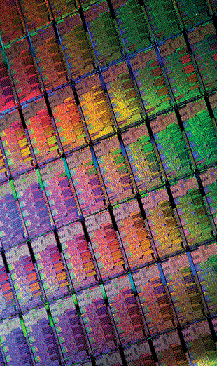Big role filled by tiny switch from old design
 Engineers in the United States have taken a pre-World War II computer technology, made it so small it can no longer be seen, and put it in a box.
Engineers in the United States have taken a pre-World War II computer technology, made it so small it can no longer be seen, and put it in a box.
That description is a reduction almost of the scale that researchers have reduced computer switches and logic gates for the next generation of electrical components.
A new report delivered at the International Electron Devices Meeting in the US has described a technique to build nanoscale switches and logic gates that operate more energy-efficiently than anything before, and they seem much more durable too.
Electro-mechanical switches were the building blocks of electronics before the solid-state transistor was developed during the war. The newversion made from silicon carbide, at the very smallest scale, snaps on and off like a light switch but with none of the energy-wasting current leakage that plagues the smallest electronics today.
In fact the one moving part of the ridiculously small switch is about one cubic micron in volume, more than a thousand times smaller than devices made in today's mainstream micro-electro-mechanical systems (MEMS). As a result, this switch can move much faster and is much lighter.
Research report that switch has operated for more than 10 million cycles in air, at ambient temperatures and high heat without loss of performance – a lot longer than most other candidates for a non-leaking switch.
The excellent heat tolerance may enable electronics-makers to build a computer that operates within the fiery heart of a nuclear reactor or jet engine.
Silicon transistors start to deteriorate at around 250 degrees (Celsius), but testing has shown the silicon carbide switches can still operate at more than 500 degrees.
“In our pockets and backpacks, nowadays we often carry mobile devices that consist of billions of such building blocks, which are switching on and off to perform the information processing functions,” explained Philip Feng, professor of electrical engineering and computer science at Case Western Reserve and leader of the project.
Silicon-based metal-oxide-semiconductor field effect transistors (MOSFETs) have certainly provided many extraordinary technologies enjoyed today, but their miniaturisation is grinding to halt against the physical limits of the material.
“The silicon switches are leaking power at about 1 to 10 nanowatts each,” Feng said.
“When you have a billion of these on a computer chip, you're losing a few to tens of watts of power. That will consume the battery you carry, even when the transistors are not actively performing computing functions.”
The research team has made three-terminal, gate-controlled switches and different kinds of logic gates from silicon carbide – a new approach to the fundamental elements for computing and communications.
“Compared to silicon and other common materials, SiC is quite special because it is much more resistive to oxidation, to chemical contaminants and to wear,” Feng said.
“Those properties should lend themselves to devices with more robust performance while protecting them from harsh operating environments.”
More details are available to attendees of the International Electron Devices Meeting, and will soon be published online.







 Print
Print